Back to Blog
How to start a consulting business in 2024 (in 7 steps)
[Hide]
Two years ago, I realized that what I was doing at my 9-5 job could easily be turned into a consulting business where I made my own hours and decided who I wanted to work with.
Time flexibility, autonomy, and income potential were at the top of my list of things I wanted to accomplish.
But, I also noticed that there were many consultants and agencies in my niche giving lackluster advice. I wanted to bring a new approach and be a guiding light to business — which is what essentially allowed me to consistently bring in new clients and help me achieve what I wanted in terms of time freedom and finances.
However, starting my consulting business isn’t something that happened overnight. In fact, when I quit my job, it took me almost a full year to figure out what I was doing and to make any sort of living income.
But, don’t let this discourage you. I clearly made A LOT of mistakes. When I first started, it felt like trying to scale Mount Everest barefoot. Though it seemed like an impossible task, the journey need not be so daunting.
This guide is your sherpa up that mountain, offering practical steps on identifying your niche expertise, creating an effective business plan based on client pain points, and managing finances like a pro. We'll even dive into legal aspects and relationship-building strategies for long-term success.
Intrigued? Let’s make this journey together!
What is a consulting business?
A consulting business, at its core, is about problem-solving. It's where an expert in a specific field offers advice and strategies to individuals or companies who need it.
This kind of business opportunity can be highly rewarding since businesses are always looking for ways to enhance productivity, generate more revenue, and find solutions to intricate issues.
The essence of being a consultant lies not just in having specific knowledge, but also knowing how to apply that knowledge effectively. That's why experience plays such a crucial role here — the more problems you've solved before, the better equipped you'll be to tackle new ones.
In addition to solving problems, consultants often help with implementing solutions too. This might involve coaching team members on new processes or helping set up systems that facilitate improvement.
Consulting spans many industries — from IT and management, all the way to finance and HR. What ties them together? The fact they're built around offering specialist insight others don't have access to.
Now, let’s get into the steps you can take to start your own consulting business. These steps are based on my own experience of starting my marketing consulting business two years ago.
7 steps to start a consulting business in 2024
Here are nine steps on how to start a consulting business:
- Master a craft in a specific niche
- Create a business plan based on pain points
- Setting up your online workspace
- Marketing your business to acquire clients
- Managing cash flow and your finances
- Building relationships and referrals
- Taking care of the legal stuff
Okay, let’s dive deeper into each step.
1. Master a craft in a specific niche
Before you launch your consulting business, hone your skills to become a master in the specific niche. It's insufficient to just be familiar with an industry or field — you need to excel.
Your clients will rely on your expertise and advice for their business decisions. If you aren't fully equipped with deep knowledge of the field, it might lead to ill-advised guidance which can harm both parties involved.
This doesn't mean spending decades working in that particular field before taking the plunge into consulting though. But yes, having years of experience would certainly add credibility.
Finding your niche
Choosing a niche isn’t as complicated as it sounds — it’s all about identifying where your passion meets proficiency. Start by analyzing what interests you most and then look at how proficient or skilled are in that area. Here’s some help if needed.
Becoming an expert
To achieve mastery in any given domain, consistent learning is crucial along with hands-on experience. HubSpot has detailed insights on how anyone can grow from being good at something to becoming great.
Avoid client disservice
If I’m honest here, entering consultancy without sufficient expertise may do more harm than good to your client’s businesses due to its high-stakes nature (depending on the industry). This reinforces why mastering a craft within a chosen niche is non-negotiable when thinking about starting your own consultancy business.
2. Create a business plan based on pain points
Building your consulting venture starts with a solid game plan. A solid business plan addresses the real issues potential clients face in their businesses.
To start, you need to know what keeps your target market up at night. Your expertise should align with these concerns and provide solutions that alleviate them.
The next step is setting goals for your consulting business that directly address these pains. This will not only guide the direction of your services but also show prospective clients how valuable you can be to their success.
You'll then want to map out strategies for attracting new customers who experience these specific problems. The aim here is to position yourself as an expert problem-solver within this space.
Try looking in online communities for what problems and conversations are happening in your niche. Reddit is a great place to start if you’re not sure where your community hangs out. Try Googling something related to your niche and type in “reddit” after to see what conversations show up.
And last but not least, sketch out financial projections considering all these factors into account. Here’s where you’ll outline anticipated income streams and expenses tied specifically to solving client problems — this helps ensure sustainable growth for both parties involved.
Note: Don't forget tools like Copilot make managing finances easier by offering features such as invoice templates and third-party integrations like QuickBooks.
Once you have a general idea of what your goals and objectives are, it’s time to take some tangible action.
3. Setting up your online workspace
If you're about to start a consulting business, getting organized is crucial. But it doesn't mean having papers and sticky notes scattered all over your desk.
Your workspace needs to be as digital and streamlined as possible. This is where Copilot, a modern client portal for service businesses, comes in handy.
The power of Copilot: Everything at your fingertips

Copilot offers an intuitive platform that lets consultants manage everything from contracts, invoices, files, messaging, intake forms, and more in one place. Imagine having a clutter-free desktop but with access to every essential tool needed for your work.
A community you can count on
You might be wondering if this setup works for other consultants too. Absolutely. In fact, one of the largest customer bases of Copilot consists of successful consultants who decided to streamline their operations digitally.
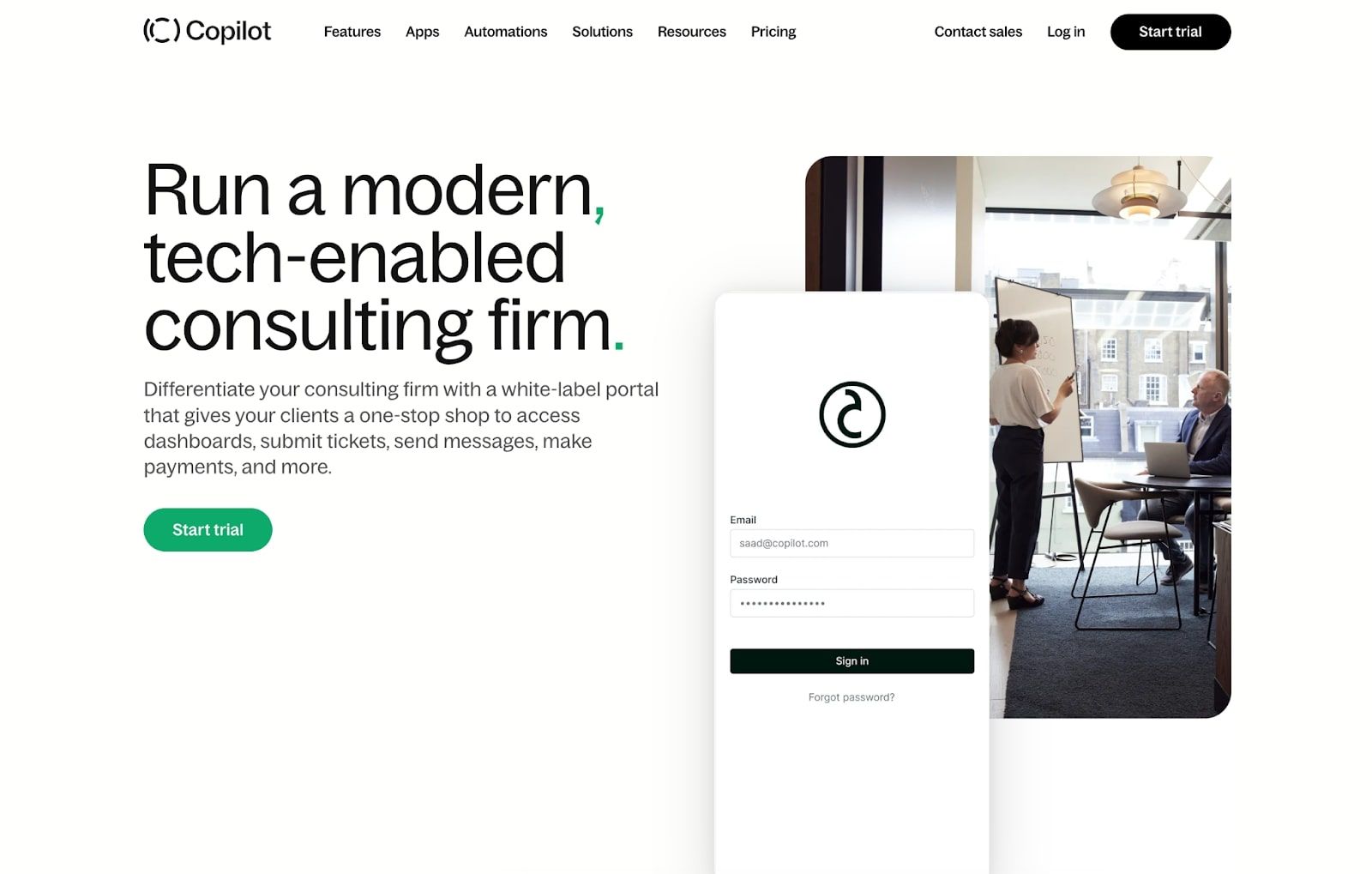
Copilot isn’t just about managing paperwork, it's also about fostering relationships with clients through seamless communication features built into the system. It keeps conversations flowing smoothly while making sure important messages don't get lost in translation or buried under heaps of emails.
Say goodbye to disorganization chaos
To say starting a consulting business can be chaotic would be an understatement. But thanks to tools like Copilot, keeping track becomes less daunting and more efficient — letting you focus on what truly matters: providing exceptional services for your clients.
4. Marketing your business to acquire clients
Realizing who requires your services is the key to advertising them successfully. To stand out in the crowded market, you need a unique selling proposition (USP). This is what sets you apart from others and makes clients choose you over competitors.
Once you figure out who you want to speak to, and what you want to speak about, it’s time to figure out how you’re going to reach your ideal clients. Many consultants initially take an outbound approach — usually reaching out to prospective clients via LinkedIn.
Social media platforms are excellent places for promoting your consultancy. You can use these channels to share valuable content related to your niche, positioning yourself as an expert.
However, note that taking the “content creation” route on social media can take a while to see some tangible results. This is definitely the route to go down for the long term. But, if you’re just starting out, you need to sign your first client as quickly as possible. And, to do this, many consultants (myself included) do a cold reachout approach.
Email remains one of the most effective ways to reach potential clients directly. An email newsletter filled with insightful advice can be just the thing that converts prospects into paying customers.
If you have the time, you can also go to events related to your industry and network with people. The rate of how efficient this will be depends on your industry. For me, as a marketer, this wasn’t the best option as it is very time-consuming (and I’m sort of an introvert). But, for non-tech-related industries, this is often a great place to start.
Some things you can do to network include:
- Nurture relationships within professional networks such as LinkedIn or industry-specific forums.
- Join local business groups and attend events where prospective clients might hang out.
- Talk at conferences or webinars — sharing knowledge helps build credibility and attract potential leads.
As your business grows, you can shift your focus to acquire clients “passively.” By passively, I mean inbound marketing. Here are some strategies:
- A well-optimized website attracts organic traffic; consider SEO blogging regularly on topics relevant to your expertise.
- Publish whitepapers or case studies demonstrating how you've helped previous clients achieve their goals. It’s proof that gives confidence.
- Copilot's client portal software, a powerful tool used by many consultants like myself, integrates smoothly with other marketing tools, letting you automate processes and focus more on delivering value.
5. Manage Cashflow and Your Finances
Running a successful consulting business isn't just about your expertise. It's also about smart money management. In the early days of your business, you’ll most likely act as the CEO, CMO, COO, and CFO — yeah, it’s a lot. But you’ll gain a lifetime of experience in a short amount of time.
One of the most crucial “roles” early on will be the CFO (chief financial officer). Most businesses die because they run out of capital. So, don’t take this aspect lightly.
When starting out, consider packaging your services. Determine the appropriate pricing for your consulting services that is competitive yet does not undervalue yourself. Don't undersell yourself but make sure you're still competitive.
Invoicing made easy with Copilot
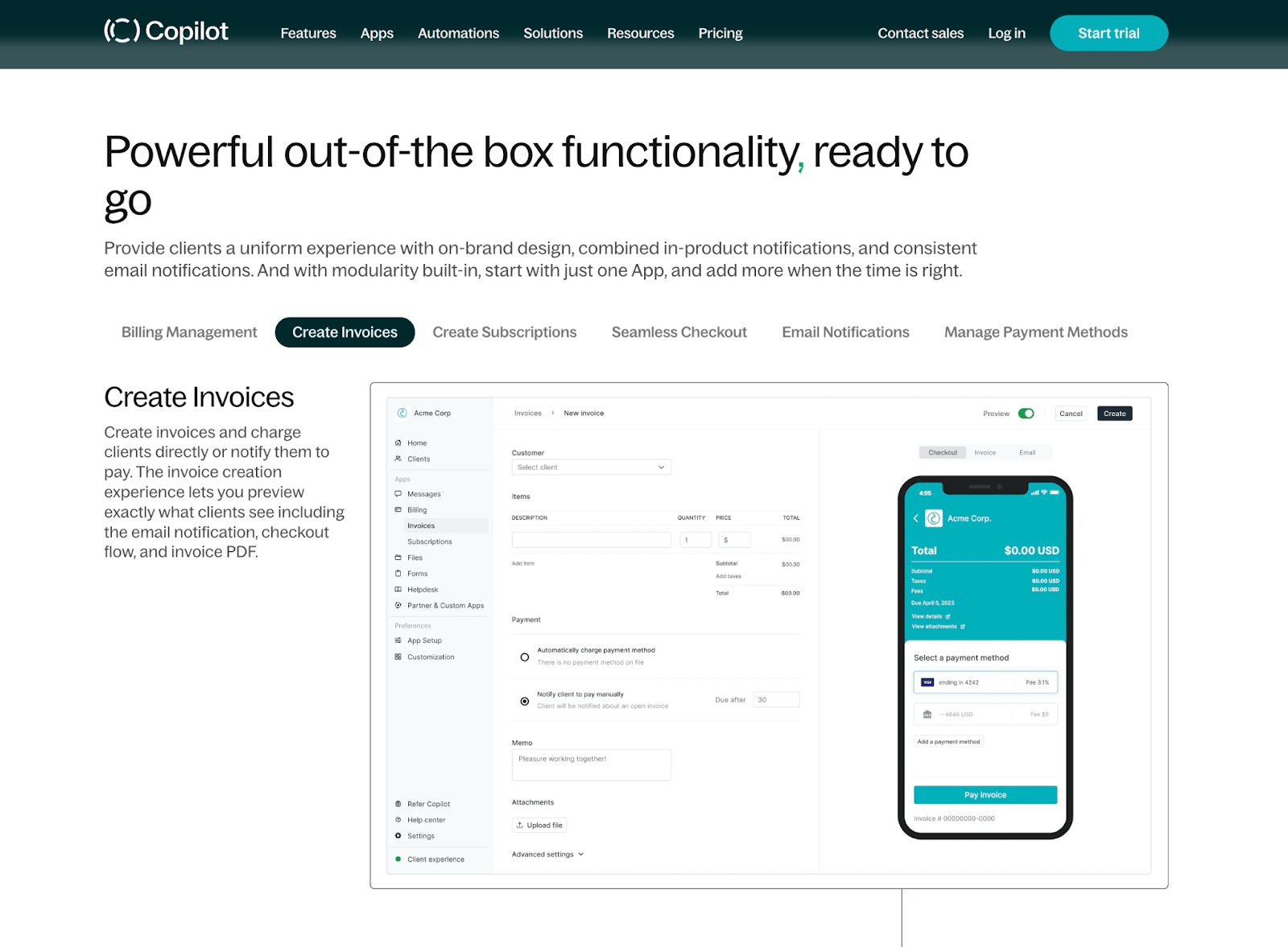
Sending invoices shouldn’t be a chore. With Copilot’s invoicing feature, it doesn’t have to be. Create branded invoices and even set up recurring subscriptions — no sweat.
Also, to manage cash flow effectively, keep track of all expenses – both big and small. From office supplies to travel costs, every penny counts. This is where integrations with your back office platform, like Copilot, comes in handy.
Copilot integrations make life easier
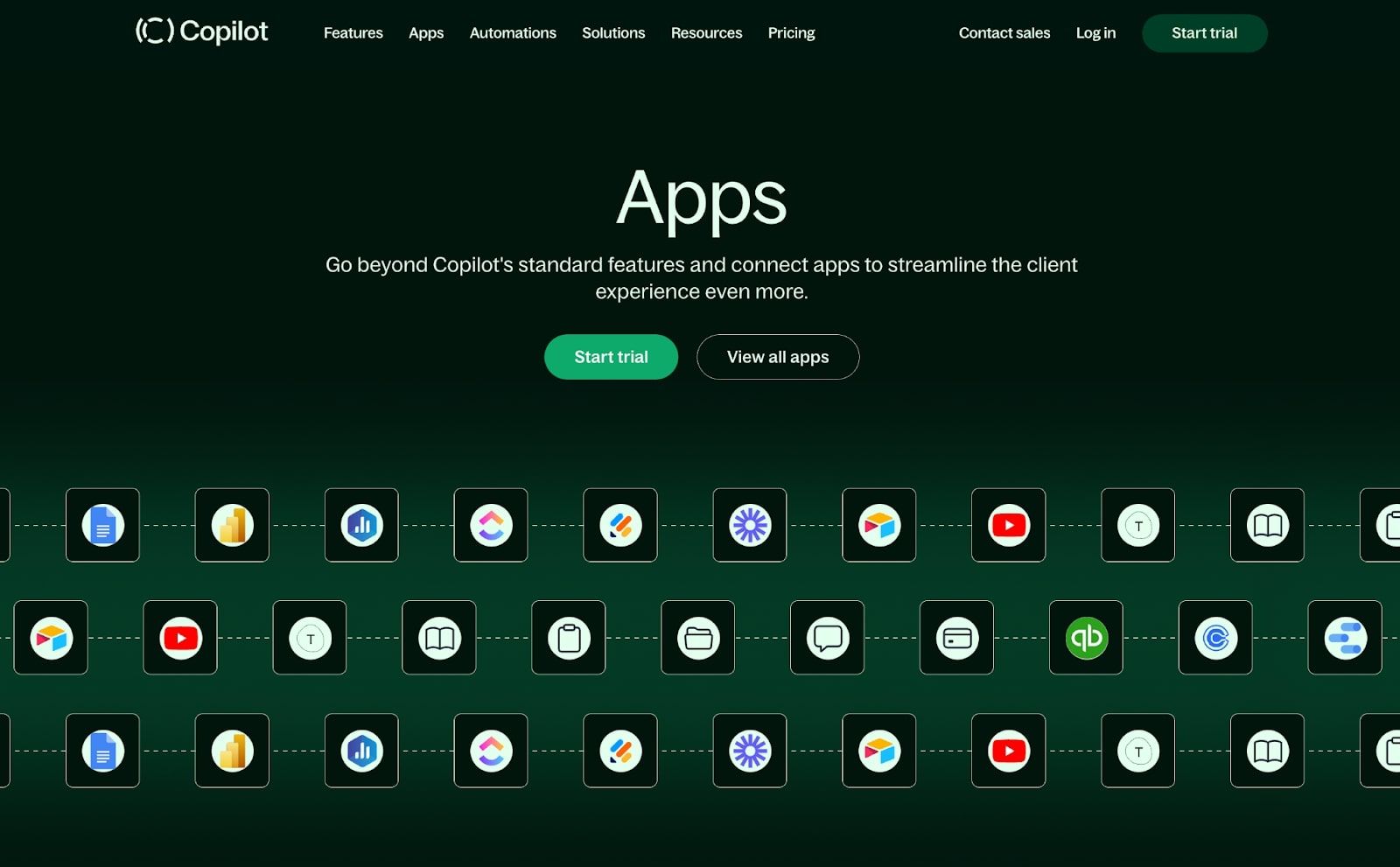
Fumbling between different apps? Let Copilot do the heavy lifting by integrating with third-party applications like QuickBooks for seamless financial management.
6. Building relationships and referrals
You might be wondering how to get more clients for your consulting business. The secret? It's all about building solid relationships.
People trust people, not businesses. So it's crucial that you focus on developing genuine connections with your clients. They're much more likely to recommend someone they like and trust — that could be you.
In my marketing consulting business, after just two years of dedicated relationship-building, I started seeing a consistent stream of client referrals from past customers I'd done great work for. This is the power of word-of-mouth.
The power of networking
Beyond individual clients, don't forget the potential power within professional networks too. Connect with other consultants or professionals in related fields — these contacts can also provide valuable client referrals if they know and respect your work.
Maintaining client relationships
Maintaining those strong bonds even after projects end is equally important because happy clients are the best advertisers for your services. Regular check-ins let them know you value their partnership long-term.
Acing customer service
Finally, ace customer service at every step along the way. Delivering high-quality results is a given but being responsive, respectful, and easy to work with gives added reasons for referral recommendations.
Remember: Happy clients = more referrals.
7. Take care of the legal stuff
To start a consulting business, you'll need to tackle some paperwork first.
Make sure to check your local laws and register your company name with the authorities in your area so they know you're ready to conduct business and pay taxes. Registering your small business with the local government informs them that you're in operation and prepared to pay taxes. It might sound daunting, but it's not as scary as it seems.
Choose your business structure
The type of structure can affect how much you pay in taxes and your personal liability. Do some research or get help from an attorney or CPA. In the US, many consultants operate with an LLC (Limited Liability Company). But, this will all depend on your preference and practice.
You’ll also want to open a separate business bank account to separate your personal finances from that of your business. This will help you avoid headaches when it comes to tax season.
Nail down licenses and permits
You may also need specific licenses or permits depending on what kind of consulting work you do. For example, if environmental consultancy is your thing, certain certifications are required.
Tax obligations
Avoid any unpleasant surprises by understanding tax obligations upfront. Are you aware that consultants often have self-employment tax?
Breathe easy with liability insurance
Last but certainly not least, consider getting liability insurance for peace of mind because accidents happen even when we wish they didn't. This isn't everything there is to starting a consulting biz legally, but these steps will set solid foundations.
Can anybody start a consulting business?
Well, the short answer is yes. But it's more about who should. The truth of the matter is that anyone can technically become a business owner and start a consulting firm. You don't need any special license or degree to hang up your shingle and call yourself a consultant.
This may seem like great news for those itching to escape their nine-to-five grind and set off on an entrepreneurial adventure.
However, there's more than meets the eye
Becoming successful in this field requires something money can't buy — expertise. It’s not just about having knowledge; it’s also about being able to apply that knowledge effectively for clients' benefit.
Your success hinges on demonstrating your skills in tangible ways. This could be through past work experience, professional certifications, academic achievements, or even client testimonials praising your abilities.
To really hit home with potential clients and succeed as a consultant you'll need a solid business plan. This helps demonstrate how you're going to solve problems for clients — essentially why they should choose you over someone else.
Above all else though, remember confidence counts. To thrive as a consultant you must believe in yourself before expecting others (clients) will too.
Copilot: How consultants manage their consulting business
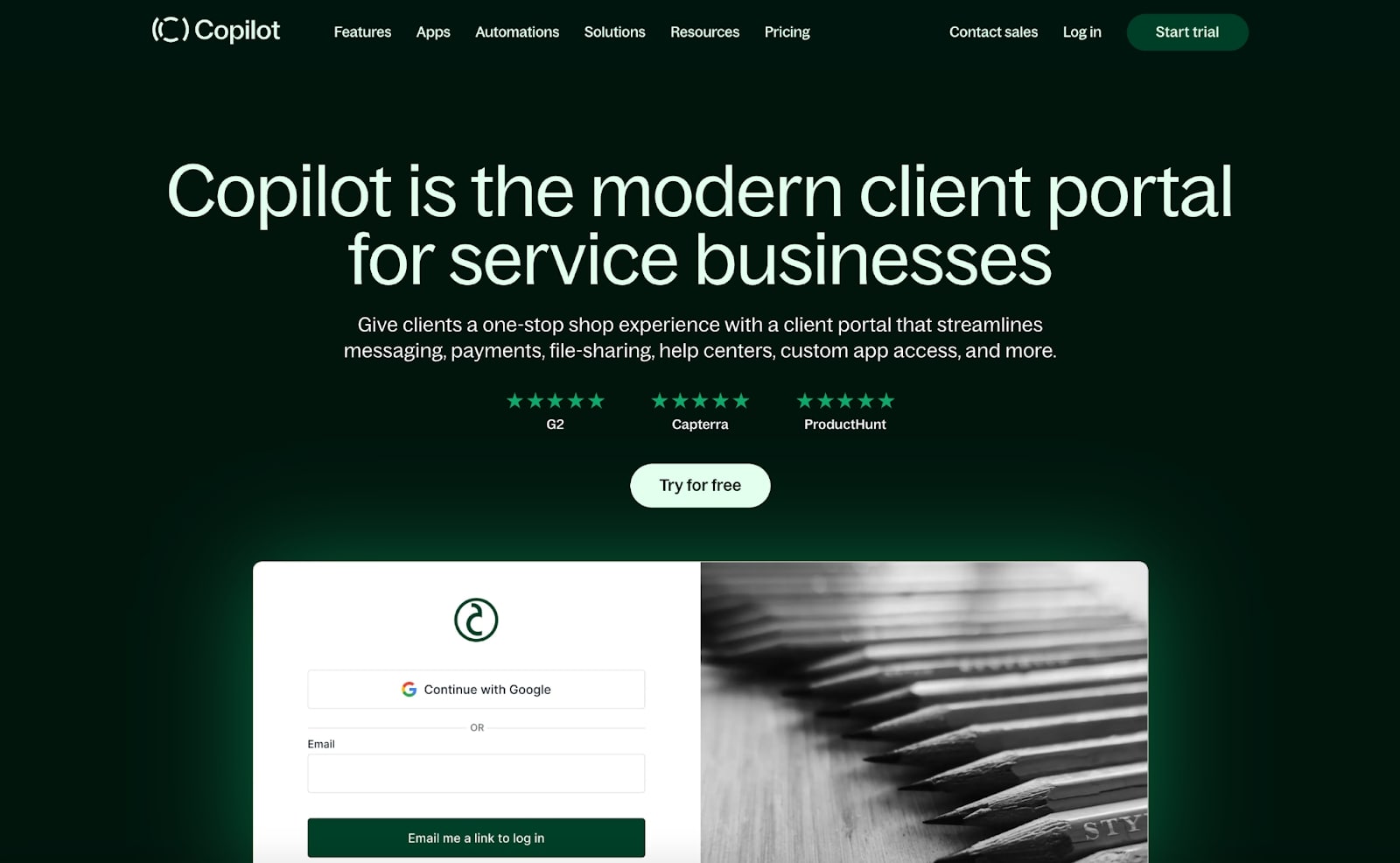
The journey of starting a consulting business is an adventure filled with twists and turns. But one tool that can help smooth out the bumps in this road is Copilot.
Crafting your workspace with Copilot
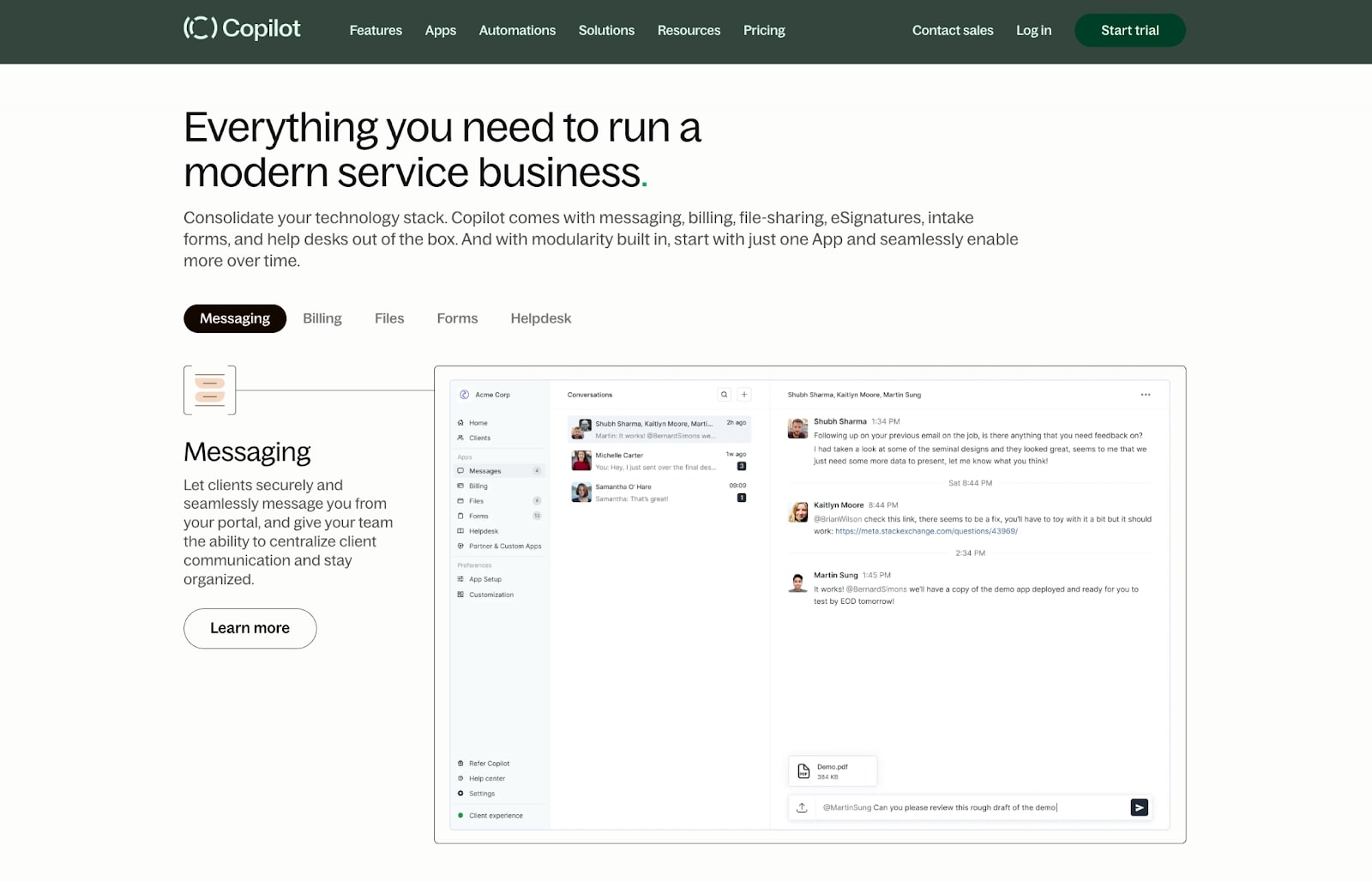
A well-organized workspace is essential for success, and that's where Copilot shines. This client portal platform lets you keep track of contracts, invoices, files, messaging, and forms all in one place.
Financial management made easy
No need to dread financial management anymore. Copilot makes it simple by letting you create branded invoices and recurring subscriptions right from your dashboard.
Bonus? It even integrates seamlessly with third-party apps like QuickBooks so you have everything under control without breaking a sweat.
Fostering client relationships
I've been running my marketing consultancy for two years now — believe me when I say relationships are key.
If done right using platforms like Copilot can get consistent referrals from past clients who loved working with us because we did an amazing job managing their projects smoothly through the portal.
Growing Your Consulting Business With Confidence
In conclusion, there’s no doubt about it: Starting a consulting firm isn’t easy. But, having tools such as Copilot on your side gives both newbies & experienced consultants the confidence they need to grow their businesses effectively and efficiently.
Conclusion
Launching a consulting startup is a complex adventure that goes far beyond just announcing your readiness to serve. Finding your niche where your expertise aligns with industry trends and new business needs is key.
If you’ve made it this far into the article, you've mastered the art of crafting an effective business plan that's not just a document, but a strategic roadmap addressing the real pain points of new clients. We've dove into client portals, equipping you with robust online workspace setups and innovative marketing strategies to captivate and retain clients.
We navigated the financial landscape, providing practical advice on project management tools like Copilot, designed to streamline your invoicing and financial tracking — crucial for any entrepreneur eager to maintain a healthy cash flow. We also shed light on the significance of relationships in the consulting industry — these connections are not merely advantageous but are the lifeblood for referrals and sustained growth.
Legal stuff? Consider it covered. Everyone is now equipped with the knowledge that diligent attention to legalities and choosing the right business name from the outset can prevent future legal entanglements.
Whether you're eyeing a niche in management, IT consulting, or any of the other types of consulting, this guide has laid the foundation. You're not just starting a new consulting practice — you're sculpting a beacon in the consulting industry.
Launching your consulting business is no longer akin to scaling Everest barefoot — it's an exhilarating climb we've prepared for together. With the toolkit you've assembled, the path to success is clear, and the summit is within reach.
Share this post
Sign up for our newsletter
Subscribe to our newsletter to receive emails about important announcements, product updates, and guides relevant to your industry.
